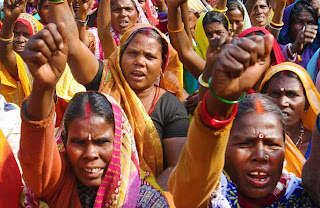Women's Rights
Women’s rights around the world is an important indicator to understand global well-being.A major global women’s rights treaty was ratified by the majority of the world’s nations a few decades ago.
Yet, despite many successes in empowering women, numerous issues still exist in all areas of life, ranging from the cultural, political to the economic. For example, women often work more than men, yet are paid less; gender discrimination affects girls and women throughout their lifetime; and women and girls are often are the ones that suffer the most poverty.
Many may think that women’s rights are only an issue in countries where religion is law, such as many Muslim countries. Or even worse, some may think this is no longer an issue at all. But reading this report about the United Nation’s Women’s Treaty and how an increasing number of countries are lodging reservations, will show otherwise.Gender equality furthers the cause of child survival and development for all of society, so the importance of women’s rights and gender equality should not be underestimated.
The informal slogan of the Decade of Women became “Women do two-thirds of the world’s work, receive 10 percent of the world’s income and own 1 percent of the means of production.”
Richard H. Robbins, Global Problems and the Culture of Capitalism, (Allyn and Bacon, 1999), p. 354
What Are Women Rights
They have similar rights as men, they are Human being and have :
Right of freedom
Right of live as per thire desires
Right of to step forward toward successful life
Right of work in any field
similarly they have all equal rights as a man's haveWomen's Suffrage L: (Women Rights)
Women's suffrage also known as Woman Suffrage is the right of women to vote and to stand for office. Limited voting rights were gained by women in Sweden, Finland and some western U.S. states in the late 19th century. International organizations were formed to coordinate efforts, especially the International Woman Suffrage Alliance (1904).In 1893, New Zealand, then a self-governing British colony, granted adult women the right to vote and the self-governing British colony of South Australia did the same in 1895, but also permitted women to stand for office. Australia federated in 1901, and women acquired the right to vote and stand in federal elections from 1902, though uneven restrictions on Aboriginal women voting in national elections were not completely removed until 1962.
The first European country to introduce women's suffrage was the Grand Duchy of Finland, then part of the Russian Empire, which also produced the world's first female members of parliament in the 1907 parliamentary elections. Norway followed, granting full women's suffrage in 1913. In most Western countries, women's suffrage came after World War I, with some important late adopters being France in 1944 and Switzerland in 1971.
Women's suffrage has generally been recognized after political campaigns to obtain it were waged. In many countries it was granted before universal suffrage. Women's suffrage is explicitly stated as a right under the Convention on the Elimination of All Forms of Discrimination Against Women, adopted by the United Nations in 1979.
Women Has Equal Right For Vote As A Men: (Women Rights)
Pakistan Ulema Council has said women have equal rights to vote and that it is not religion that bars them from voting but the feudal system.The Council held a conference here on Thursday wherein its decree says the setting up of separate polling booths for women because women enjoy equal right to vote as men.The polling staff thus should comprise only women where no namehram is present.It expressed the confidence that a better leadership would emerge out of forthcoming elections if people of Pakistan exercised their right to vote free from pressure, coercion and expediencies.It is feared that 52 percent population will be left deprived of their right to vote in case women are debarred from voting that will prevent their access top parliament.
All Pakistan Ulema Council Chairman Hafiz Muhammad Tahir Mahmood Ashrafi dwelt upon the edict and guidance was sought from religious scholars and the Ulema of the Council took part in the research of the edict.At the end of the conference a joint statement was issued condemning the killing of people in Quetta, Abbas Town in Karachi and Joseph Colony in Lahore and requested the government to arrest the culprits and give them exemplary punishment.
The statement said Prophet Muhammad (PBUH) is not only sent to the Muslims but to the entire world and is respectful not only for Muslims but for the entire humanity.Anyone committing blasphemy against the Prophet (PBUH) could not be a member or representative of any religion.
The statement said the attendants of the conference believed that everyone living in Pakistan, whether a Muslim or a non-Muslim enjoys equal right to live and any Pakistani discriminating others on the basis religious belief does not act against the spirit of Islam but also ideology as well.









0 comments:
Post a Comment